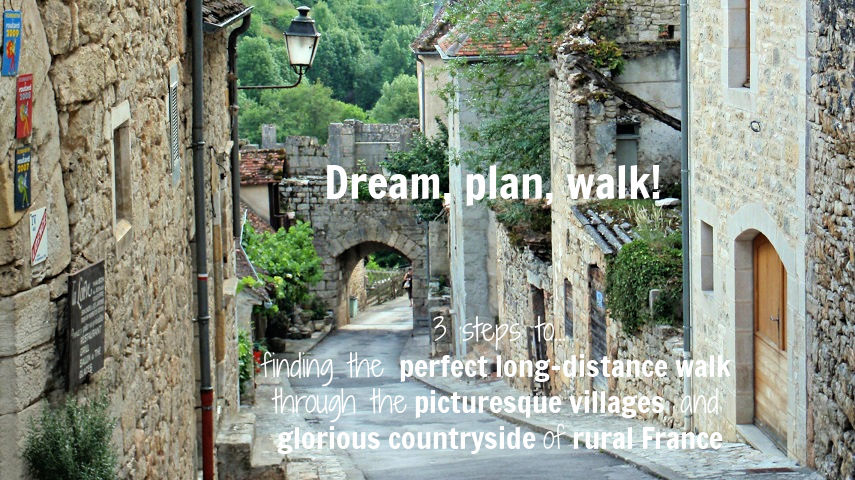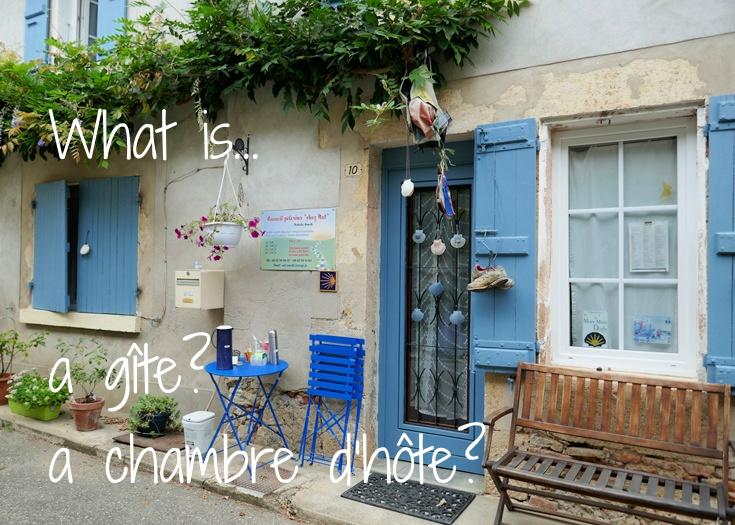
As you begin your search for places to stay during your long-distance walk in France, it’s likely you’ll encounter a few descriptions not commonly used in English accommodations. The most common are chambres d’hôtes and gîtes, and while there are often a lot of similarities between the two, there can be some striking differences.
There are four main types of accommodation offered in France—hotels, chambres d’hôtes, gîtes and campgrounds.
Let’s take a closer look at each.
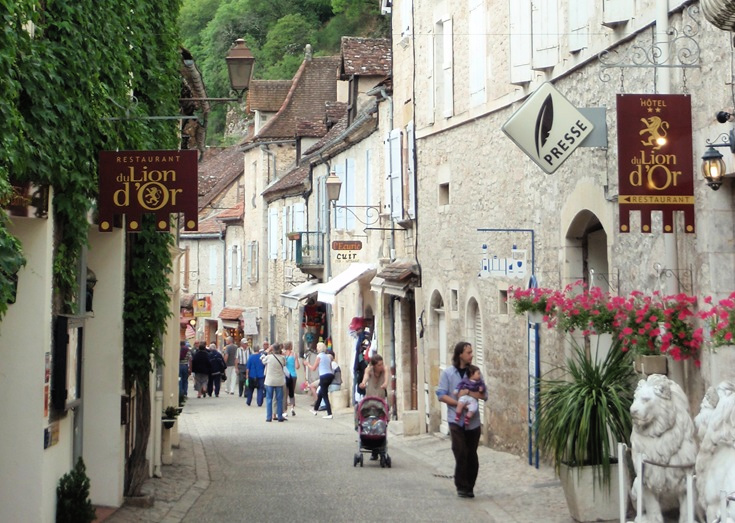
Hôtel du Lion d’Or in the medieval city of Rocamadour (Martel to Rocamadour walk and Chemin de Saint-Jacques, Rocamadour variante)
Hotel
Hotels in France are similar to hotels the world over. They are rated by a star system with 5 stars being the best.
For an overnight stay, 2 or 3 stars are fine and your room should be comfortable and clean. Some hotels, including the Logis chain, do not participate in the rating system and zero stars does not always indicate poor quality.
Many hotels offer a demi-pension or half-board option that includes a two-course (entrée + mains or mains + dessert) dinner from a set menu at a very reasonable price.
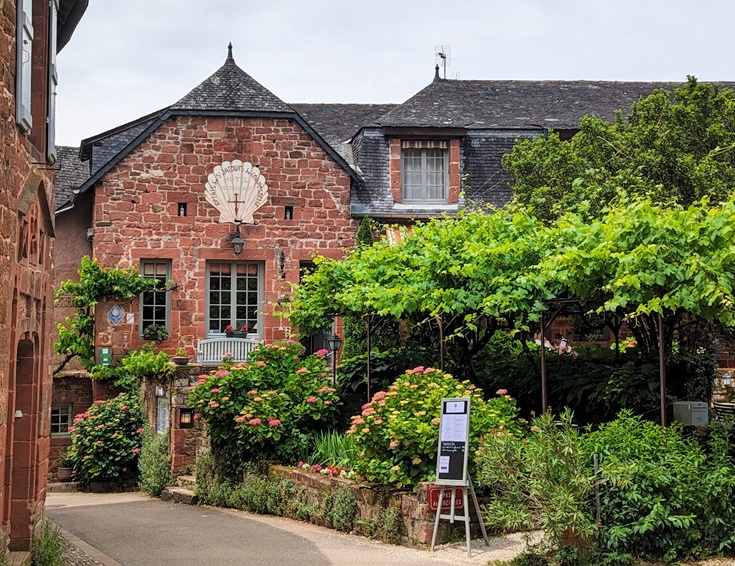
Le Relais de Saint-Jacques in Collonges-la-Rouge (Martel to Rocamadour walk), a delightful hotel – with no star rating!
In small villages, you may find the hotel is located in a beautiful historic building that was once a manor home. In this case, you may occasionally find that you will be sharing a bathroom with other rooms on the same floor. And it is probably safe to assume that outside of the larger towns, your lodgings will not have an elevator or anyone dedicated to carrying your luggage upstairs. If either of these circumstances will influence your choice, it is best to ask before you book.
In French spelling, os is often replaced by ô. A French hôtel may sometimes go by its traditional name of hostel. While a hotel and a hostel conjure up quite different images in English speaking countries, this may not be true in France. Before you skip over all hostels, check the website and make your own decision.
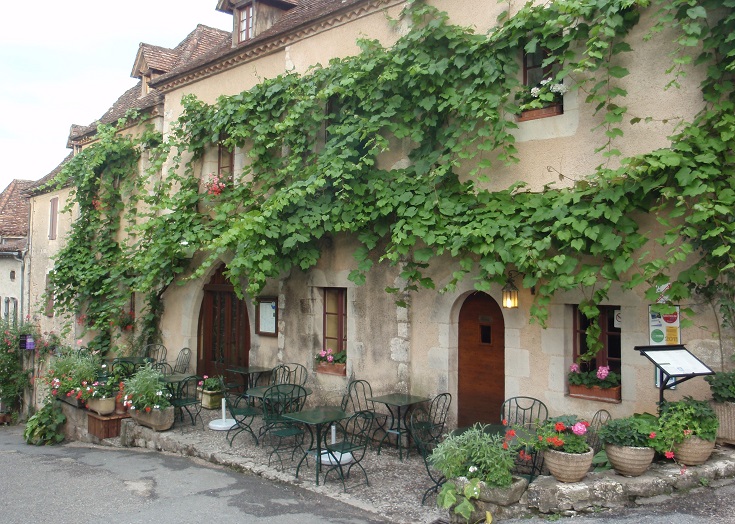
Auberge du Sombral in Saint-Cirq-Lapopie (Chemin de Saint-Jacques, Célé variante)
An auberge is the equivalent of the English inn. In the not-too-distant past, travellers would stop at the inn for a hearty meal and if the day was drawing to a close, they might take advantage of any rooms available to sleep for the night (as opposed to a hotel which provided rooms and sometimes offered a meal as well).
In 1878, while walking with his donkey through the Cévennes in southern France, Scottish author Robert Louis Stevenson stopped at the inn at Chasseradès where he enjoyed dinner and, as he described it, intelligent conversation among the company of five railway engineers. And, in a room with six guests and four beds, considered himself lucky to have a bed to himself.
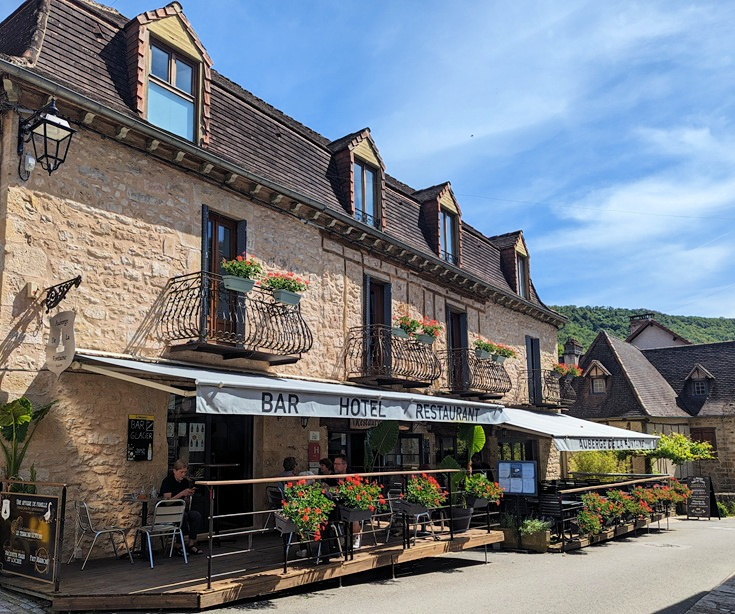
Auberge de la Fontaine in Autoire (Martel to Rocamadour walk)
Thankfully, times have changed and current regulations ensure you will not be asked to share a bed with strangers. Today, when an establishment includes the word auberge, this is usually a reference to its role in by-gone days, and you’ll most likely find a small family-run hotel offering all the services you’d expect in a much larger establishment.
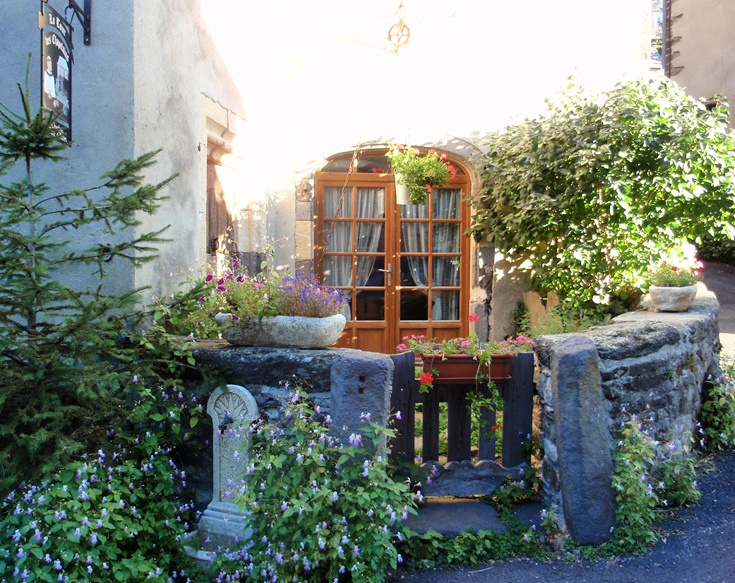
A charming corner in the front garden of La Tour des Chapelains in Saint-Chély-d’Aubrac (Chemin de Saint-Jacques)
Chambre d’hôte
Literally translating as guest’s bedroom, a chambre d’hôte is the equivalent, as you may have guessed, of the English Bed and Breakfast.
By law, a chambre d’hôte may have no more than five bedrooms and accommodate no more than 15 people. While they often have a private bathroom attached to each bedroom, they are only required to provide one bathroom for every five people. Towels and bed linen will always be provided.
Many chambres d’hôtes also offer a table d’hôte—a home-cooked meal featuring local produce or specialities. If there are other restaurants in the village, this may not be offered every night, so ask when making your reservation so that your host will be prepared.
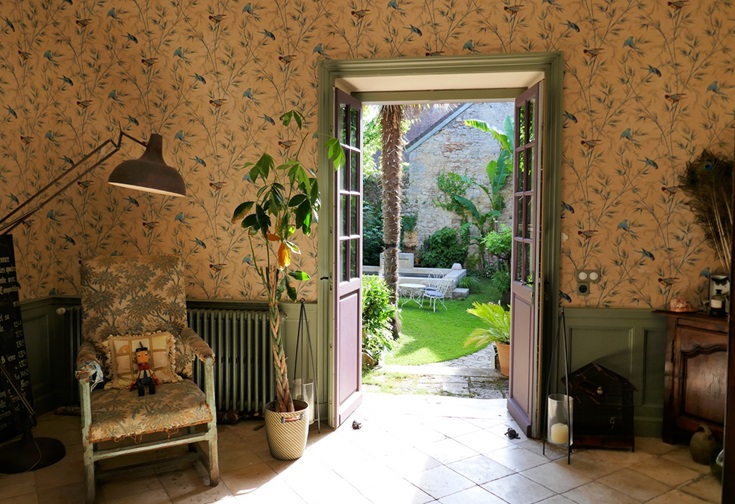
The sitting room in La Devinie in Martel (Martel to Rocamadour walk) offers a tranquil corner to sit and read or admire the garden
The more intimate atmosphere which results from the smaller number of guests offers a wonderful way to meet the locals and an opportunity to chat with your host (who will often join you for dinner—in addition to cooking it!). A smattering of French will go a long way—don’t assume English will be spoken.
If you prefer not to pre-book your room and take your chances each afternoon, you may strike out with this type of accommodation. Proprietors are very hospitable people but they tend to get on with their lives if rooms are not booked and won’t be sitting around waiting for you to call. You may be lucky but don’t rely on last minute bookings or knocking on the door without prior notice.
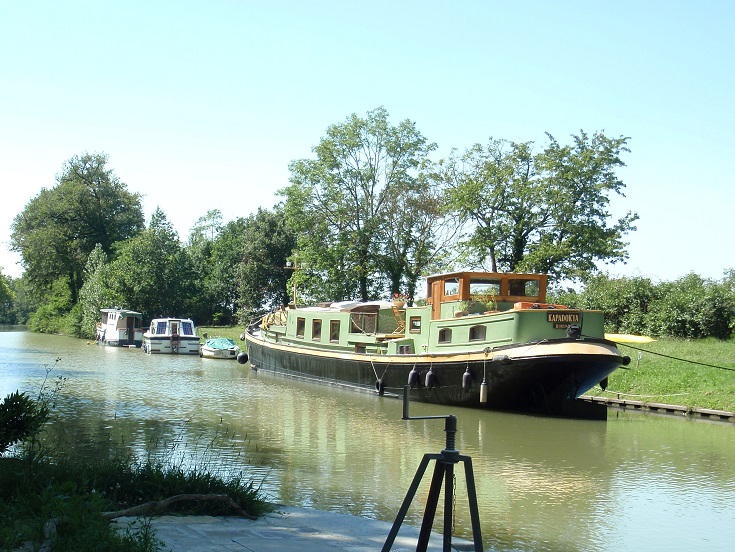
For many years, the chambre d’hôte La Péniche Kapadokya was moored near Castelnaudary on the Midi Canal but has now relocated downstream
NOTE: If you are walking along a canal and book a night on a converted barge, check that it will still be moored where you expect—a few kilometres downstream may not matter if you are driving but can be very inconvenient if you are walking.
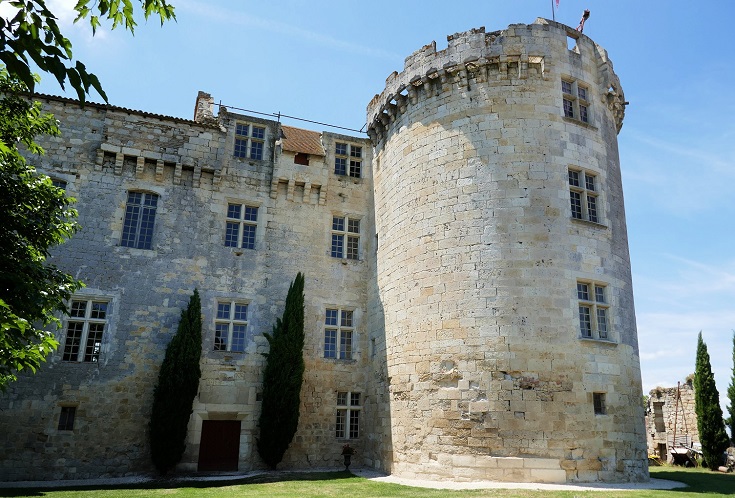
Spend the night in a castle at Chàteau de Flamarens (Chemin de Saint-Jacques) which offers dormitory accommodation and a couple of private rooms
Gîte
Gîtes, mainly found along the Chemins de Saint-Jacques, offer dormitory-style accommodation to cater for the large numbers of walkers, although smaller rooms are sometimes available.
Blankets are usually provided and, sometimes (but not always), bed sheets and a towel will be provided for a small fee. I recommend carrying a silk liner which will add very little weight or bulk to your pack and provide a layer between you and the blanket.
The price will often include a home-cooked dinner but if not, cooking facilities in a communal kitchen will be available.
Gîtes are generally very cheap and are, therefore, a good option if you want to minimise costs.
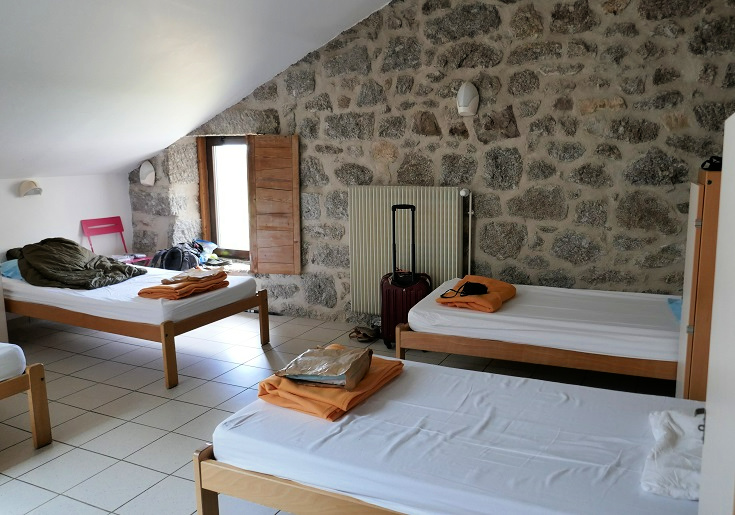
A six-bed dormitory at Le Sauvage en Gévaudan (Chemin de Saint-Jacques)
NOTE: Gîtes along the Chemin de Saint-Jacques and Chemin de Stevenson are referred to as gîtes d’étapes (or accommodation for each stage of the walk). They are generally reserved for walkers and are not usually available for stays of longer than one night (exceptions may be made, of course, at the discretion of your host.) If you are planning a rest day, opt for a night in the local hotel or chambre d’hôte. (A gîte rural refers to self-contained holiday accommodation, booked for a week or more at a time.)
Gîtes and chambres d’hôtes are usually locked once everyone leaves in the morning and do not reopen until mid or late afternoon. This is the time when the host will be cleaning and making preparations for the evening meal—and taking a well-earned break after a busy morning. Keep this in mind if you arrive in the middle of the day.
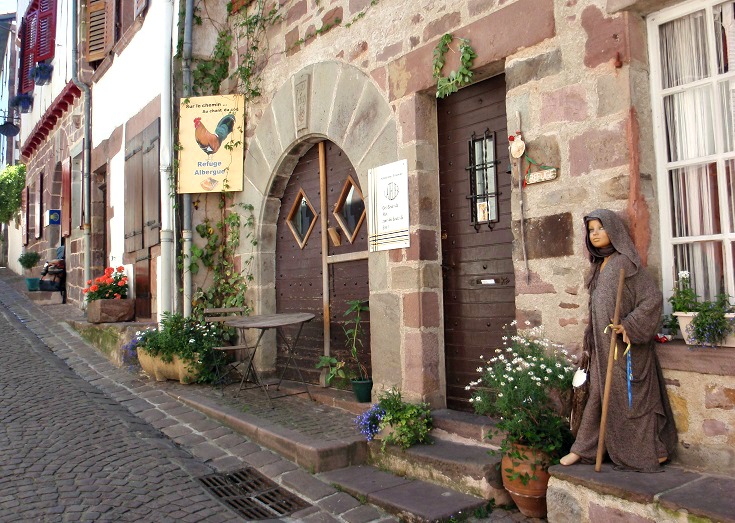
Rue de la Citadelle in Saint-Jean-Pied-de-Port (the end of the Chemin de Saint-Jacques and the beginning of the Camino Francès across northern Spain) is packed with chambres d’hôtes and gîtes offering accommodation to walkers
In Spain, gîtes are known as albergues. If you wish to sleep there, you must show your crédencial or pilgrim’s passport to prove you are walking the Compostelle.
In France, where many visitors walk sections of the trail without a passport, this is not so rigorously enforced. Those with passports are usually given priority on busy nights though and if you don’t have one, you may have to upgrade to a hotel or chambre d’hôte from time to time.
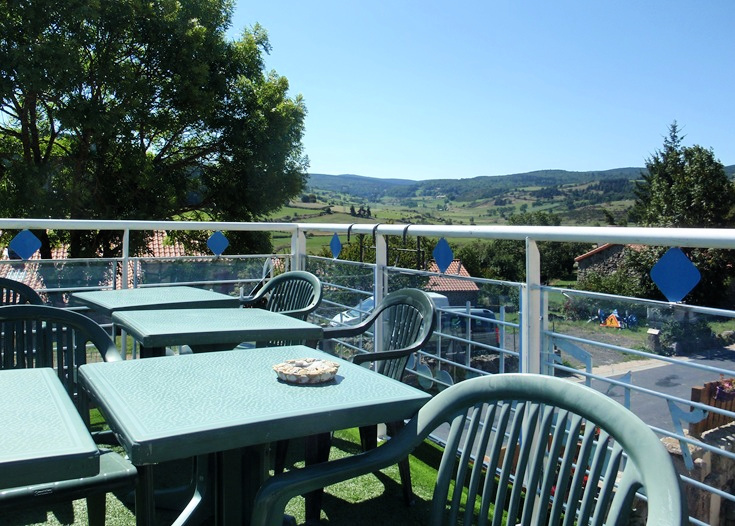
Waiting for the doors to open on the terrace of Les les 2 Pèlerins in Villeret-d’Apchier (Chemin de Saint-Jacques) which offers chambre d’hôte rooms (two or three beds with a private bathroom) and gîte accommodation (dormitories of five or six beds). I opted for a private room, but joined everyone for a fabulous meal at the communal dinner.
As you research your options for accommodation it may appear that the line between chambres d’hôtes and gîtes is fairly fuzzy.
While in Spain, a typical gîte may provide bunk bed accommodation for between 40 and 100 guests, this is rarely the case in France. Many a time, I’ve enjoyed a fabulous stay in a gîte which has offered all the comforts I’d expect to find in a chambre d’hôte, and as I update the guidebooks each year, I often find myself unsure of how to categorise some new listings.
If sharing a room with a dozen snoring strangers is your idea of a nightmare, and you’re ready to eliminate all gîtes from your search, check the websites first, and let the photos and reviews be your guide.
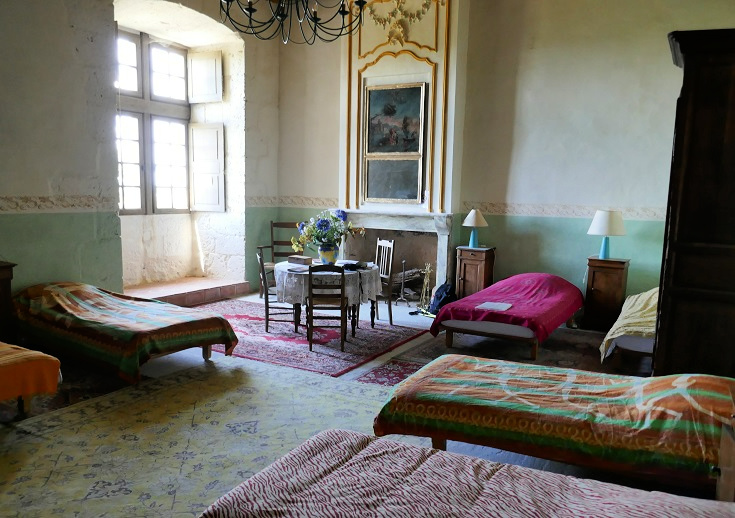
Dormitory accommodation in Chàteau de Flamarens (Chemin de Saint-Jacques)
Camping
Camping is camping and, as with the rest of the world, standards and facilities vary greatly. In small villages, the campground is usually run by the municipal council and is not obliged to open until the beginning of June. They will usually stay open until the end of September.
In popular tourist areas such as the coast of Brittany, there are many privately run campgrounds. These will often open in April or around the Easter weekend and may stay open until the end of October.
If you are walking outside of the peak summer season, the availability can be a bit hit and miss—but the worst that can happen is you spend the occasional night in a hotel. Luckily, campers tend to be fairly adaptable people but if you are camping because of a tight budget, it’s best to investigate opening times before you arrive.
I am embarrassed to admit I didn’t photograph any campgrounds so I am going to have to leave them up to your imagination.
How to book accommodation in French
Many more practical tips for long-distance walking
A comprehensive list of accommodation along with internet links is included in every I Love Walking in France digital guidebook.

